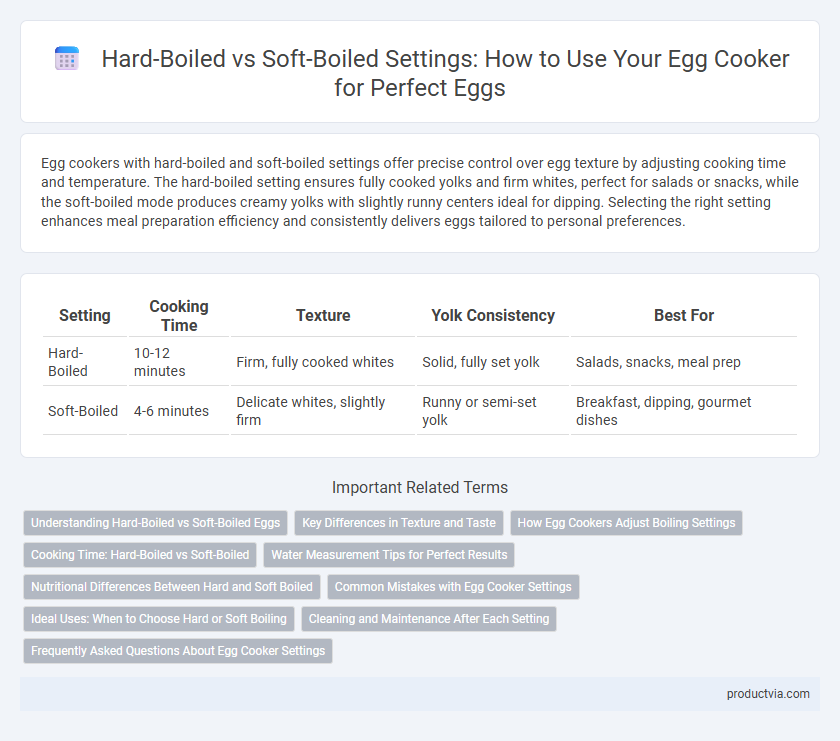Egg cookers with hard-boiled and soft-boiled settings offer precise control over egg texture by adjusting cooking time and temperature. The hard-boiled setting ensures fully cooked yolks and firm whites, perfect for salads or snacks, while the soft-boiled mode produces creamy yolks with slightly runny centers ideal for dipping. Selecting the right setting enhances meal preparation efficiency and consistently delivers eggs tailored to personal preferences.
Table of Comparison
| Setting | Cooking Time | Texture | Yolk Consistency | Best For |
|---|---|---|---|---|
| Hard-Boiled | 10-12 minutes | Firm, fully cooked whites | Solid, fully set yolk | Salads, snacks, meal prep |
| Soft-Boiled | 4-6 minutes | Delicate whites, slightly firm | Runny or semi-set yolk | Breakfast, dipping, gourmet dishes |
Understanding Hard-Boiled vs Soft-Boiled Eggs
Hard-boiled eggs are cooked until both the white and yolk solidify, typically reaching an internal temperature of 160degF (71degC), while soft-boiled eggs have a firm white but a runny yolk, usually cooked to about 140degF (60degC). Egg cookers with hard-boiled and soft-boiled settings adjust cooking time and temperature precisely to achieve the desired consistency, ensuring consistent results every time. Understanding these settings helps users tailor the egg texture, enhancing culinary versatility from salad toppings to breakfast bowls.
Key Differences in Texture and Taste
Hard-boiled eggs produced by an egg cooker have a firm, fully set yolk and a solid white, offering a dense texture and mild flavor ideal for salads or snacks. Soft-boiled eggs feature a runny yolk with slightly firm whites, delivering a creamy texture and richer taste suited for dipping or garnishing dishes. The key differences lie in cooking times and heat settings that determine yolk consistency and overall mouthfeel.
How Egg Cookers Adjust Boiling Settings
Egg cookers adjust boiling settings by precisely controlling cooking time and temperature to achieve hard-boiled or soft-boiled eggs. For hard-boiled eggs, the device maintains a higher temperature and longer cooking duration, ensuring the yolk solidifies fully. Soft-boiled settings involve shorter cook times and slightly lower temperatures, producing a creamy, runny yolk consistently.
Cooking Time: Hard-Boiled vs Soft-Boiled
Hard-boiled eggs typically require 10 to 12 minutes of cooking time in an egg cooker to achieve a fully set yolk and firm whites. Soft-boiled eggs generally take about 4 to 6 minutes, resulting in a runny yolk and tender whites. Precise control of cooking time ensures the desired texture, optimizing the egg cooker's efficiency and consistency.
Water Measurement Tips for Perfect Results
Accurate water measurement is crucial for achieving the desired texture in both hard-boiled and soft-boiled eggs using an egg cooker. For soft-boiled eggs, use less water to reduce cooking time and obtain a runny yolk, typically around 50-60 ml, while hard-boiled eggs require more water, approximately 90-120 ml, to ensure fully set yolks and firm whites. Using the included water measuring cup or following specific model guidelines helps maintain consistent results every time.
Nutritional Differences Between Hard and Soft Boiled
Hard-boiled eggs retain all their nutrients, including protein, vitamins, and minerals, with a firm texture that suits longer consumption. Soft-boiled eggs preserve slightly more vitamin B and antioxidants due to shorter cooking times, maintaining a creamy yolk rich in healthy fats. Both settings offer essential nutrients, but soft-boiled eggs may provide better bioavailability of heat-sensitive vitamins.
Common Mistakes with Egg Cooker Settings
Common mistakes with egg cooker settings often include selecting the hard-boiled option for eggs intended to be soft-boiled, resulting in overcooked yolks and rubbery whites. Misjudging water quantity can also lead to inconsistent cooking, as insufficient water prevents proper steaming while too much causes overflow or undercooking. Ensuring correct timing and water levels according to the egg cooker's manual is essential to achieve perfect hard-boiled or soft-boiled eggs.
Ideal Uses: When to Choose Hard or Soft Boiling
Hard-boiled settings in egg cookers are ideal for meal prep, salads, and recipes requiring firm yolks, while soft-boiled settings suit breakfast dishes and dishes needing runny yolks or delicate whites. Choosing hard boiling ensures fully cooked eggs perfect for slicing, whereas soft boiling preserves a creamy texture essential for dipping or garnishing. Egg cookers with precise temperature controls allow users to easily switch between these settings based on texture preference and culinary use.
Cleaning and Maintenance After Each Setting
Cleaning an egg cooker after using the hard-boiled setting requires thorough removal of mineral deposits from prolonged boiling, especially on the heating plate and lid. Soft-boiled settings generate less residue but still necessitate gentle wiping to prevent buildup of egg whites and moisture around sealing areas. Regular maintenance involves descaling with vinegar or lemon solution to ensure optimal performance and prevent damage regardless of the cooking mode used.
Frequently Asked Questions About Egg Cooker Settings
Hard-boiled settings in egg cookers typically use longer cooking times around 10 to 12 minutes to ensure firm whites and yolks, while soft-boiled settings range from 4 to 7 minutes for runny yolks and tender whites. Users often ask how water levels affect the firmness; precise water measurement guides cooking time by generating steam for the desired consistency. Egg size and altitude also influence results, so adjusting water quantity as per the appliance manual helps achieve perfect hard or soft-boiled eggs consistently.
Hard-boiled vs Soft-boiled setting for egg cooker Infographic

 productvia.com
productvia.com